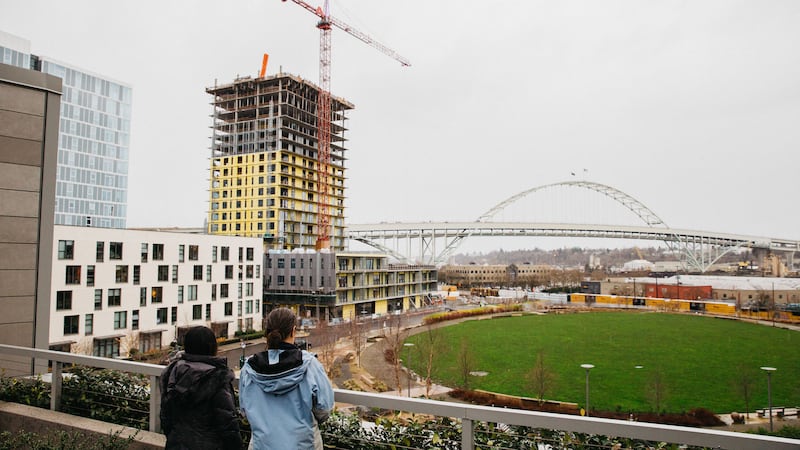For the past 12 years, a vacant lot in Portland's Goose Hollow neighborhood once slated for development has remained untouched by shovels—a monument to the power of city government to obstruct development.
In 2006, the Portland City Council overruled an approval by the Design Commission for a 21-story condo tower on the site.
That was the last time the City Council voted to completely overrule the commission, a volunteer panel tasked with signing off on big construction projects.
Until last week, anyway.
On March 7, the City Council unanimously rejected a plan to develop a Pearl District parking lot into a 17-story building with 275 apartments near the Fremont Bridge. Neighbors, some concerned about their own views, had rallied against the project ("Sky Wars," WW, Jan. 24, 2018).
The vote was just one decision on a day of reckoning for the competing goals of dense housing stock and city's aesthetic character. City leaders, who have talked for two years of a housing crisis, voted to preserve the status quo—at the expense of as many as 2,800 units of housing.
The rejected projects, including a concept for waterfront skyscrapers designed by Japanese architect Kengo Kuma, will probably get another shot at approval. But observers say the chilling effect goes deeper.
By overruling the Design Commission and bowing to the outcry of neighbors, the City Council leaves developers uncertain about the rules for winning approval of projects.
"What I worry about is the message it sends to the development community," says Michael Wilkerson, a senior economist at ECONorthwest. "If you're expecting to go quickly through the design process, it can be slowed down and derailed."
It's not clear why the City Council thinks the Fremont Place Apartments warranted overruling the already persnickety Design Commission. City commissioners last week said they weren't convinced views needed to preserved, and instead pointed to protecting the bike and pedestrian path along the river.
Commissioners declined to discuss details with WW, citing a legal prohibition on discussing land-use decisions until they are final. Last week's vote was preliminary—a final vote is in April.
But the March 7 council votes showcase the influence of a pernicious but widely held belief in Portland that the city does not need to encourage market-rate housing even as it deals with a housing crisis for low-income Portland residents.
"If you believe there is an emergency, the solution is to get more housing built," says economist Joe Cortright.
A recent building boom has helped slow rent increases. Two years ago, economists at ECO-Northwest found only 1 percent of buildings in the metro area hadn't had a rent increase that year. They now estimate 12 percent of buildings didn't see rent go up in 2017.
Economists say the crisis will only worsen for lower-income Portlanders if private development dries up, placing higher-income renters in competition with their lower-income neighbors.
The vote also showed the influence of Commissioner Nick Fish, who for years oversaw the Housing Bureau and has served as a mentor for Mayor Ted Wheeler and Commissioner Chloe Eudaly in their first year. Fish sided with Commissioner Amanda Fritz, an opponent of tall buildings—and the rest of the council followed.
But it also raises questions about Fish's commitment to housing.
In the midst of his re-election campaign, Fish sided with the voices who have been lobbying against development, including Stanley Penkin, president of the Pearl District Neighborhood Association, a longtime ally and donor to Fish's campaign (he gave $500 in September).
"I have never spoken to Stan Penkin about this project," says Fish. "He has been very careful about not talking to me about that project."
When asked by WW to square his vote with a commitment to housing, Fish defended his decision. "This design can be better and more in the public interest," he says. "We have every right to challenge developers to deliver a better product."
Wheeler tells WW he will seek a second look at the decision.
"I believe additional information is needed in the record before we make a final decision," says Wheeler in a statement. "On April 4, when the matter is scheduled to return to Council, I will make a motion to continue the hearing and reopen the record."
Developers remain alarmed.
"I have heard from multiple developers that they are hesitant to invest in the Portland central city since the City Council decision," says Kurt Schultz, principal with SERA Architects. "It's now too risky."
